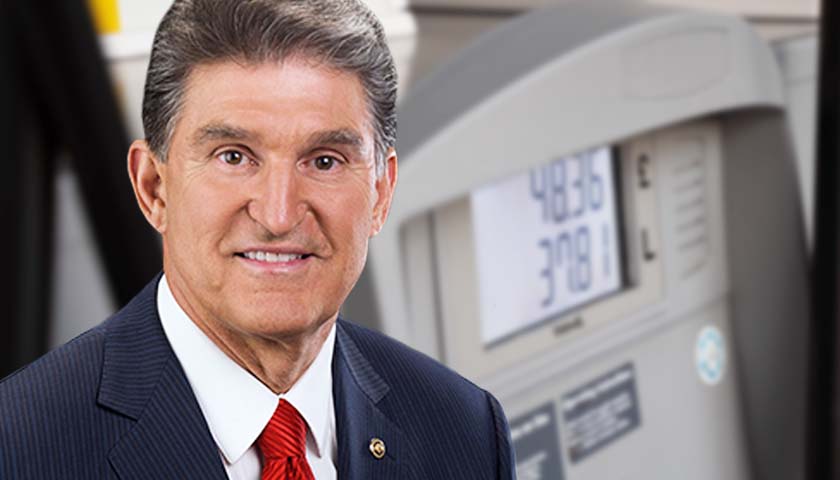by Casey Harper
Skyrocketing inflation and consumer costs are hurting President Joe Biden’s and Congressional Democrats’ hopes to pass another major spending bill through the reconciliation process.
The Department of Labor’s Bureau of Labor Statistics this week reported an 8.6% increase in wholesale prices over the past 12 months, the highest increase in years. The federal agency also said this week that the consumer price index, another key tracker of inflation, is rising at the fastest rate in decades.
These economic woes have serious political implications for Democrats.
U.S. Sen. Joe Manchin, D-W.V., pointed to the latest inflation data this week, saying “DC can no longer ignore” the problem.
“By all accounts, the threat posed by record inflation to the American people is not ‘transitory’ and is instead getting worse,” Manchin said. “From the grocery store to the gas pump, Americans know the inflation tax is real and DC can no longer ignore the economic pain Americans feel every day.”
Manchin is a key vote in the reconciliation process who has cited inflation as a reason to oppose Biden’s “Build Back Better” plan. Manchin’s agreement is key to the Democrats’ hopes of enacting the spending proposal. Republicans have also repeatedly pointed to inflation as a reason to oppose the plan, which does not have the same political support as the recently passed bipartisan infrastructure bill.
Democrats now have the tough job of selling an even larger federal spending bill to Americans amid rising inflation concerns. So far, they have argued more federal spending will actually help inflation, not hurt it.
“The best way to address inflation is to pass a bill that creates jobs, reduces bottlenecks, and is totally paid for by making sure the wealthy pay their fair share,” Democratic Leader Sen. Chuck Schumer, D-N.Y., said. “That’s just what we’re doing with the Build Back Better Act.”
Biden has made a similar point, arguing his legislation could address the problem.
“Reversing this trend is a top priority,” Biden said. “My infrastructure bill will bring down costs by reducing bottlenecks and I urge Congress to pass my Build Back Better Act – which will ease inflationary pressures.”
Critics, though, have pushed back on this claim, especially since rising federal debt accelerates inflation. The federal government prints more money to help pay for debt obligations, that leads to higher prices over time.
“Unfortunately, the spending proposed by [Schumer] risks persistent, elevated inflation as the Federal Reserve is likely to create trillions more of fiat currency to purchase government bonds, financing the gusher of federal spending,” said Joel Griffith, a financial expert at the Heritage Foundation. “This is also known as monetizing the national debt – issuing new fiat currency to finance deficit spending. This alternative to borrowing from the public or raising taxes to finance the spending results in the supply of fiat currency chasing limited economic resources leads to the price of those resources increasing – i.e., inflation.”
The Biden administration has also argued the inflation is “transitory.” Treasury Secretary Janet Yellen said this week it would level out next year, attempting to alleviate concerns.
Griffith said the federal spending is actually making the problem worse, not helping. He also rebuffed claims that the current inflation will be temporary. Some economists have said elevated inflation could easily continue into 2023.
“Without a doubt, the rise in federal spending the past year – financing by the Federal Reserve – is contributing to the very large burst of inflation,” he added. “Inflation is political. The federal government is now working hand in hand with the central bank to allow them to spend enormous quantities of money without, right now, raising taxes outright. Families which experienced a rise in cost of living exceeding their income this past year will continue to feel the consequences of this so-called ‘transitory’ inflation for years to come. The Left-wing spending proposal risks more of the same.”
That rise in inflation makes goods and services more expensive for Americans. Energy prices in particular have been a pain point for Americans and for Democrats in leadership as prices continue to skyrocket.
“The all items index rose 6.2 percent for the 12 months ending October, the largest 12-month increase since the period ending November 1990,” BLS said. “The index for all items less food and energy rose 4.6 percent over the last 12 months, the largest 12-month increase since the period ending August 1991. The energy index rose 30.0 percent over the last 12 months, and the food index increased 5.3 percent.”
– – –
Casey Harper is a Senior Reporter for the Washington, D.C. Bureau for The Center Square. He previously worked for The Daily Caller, The Hill, and Sinclair Broadcast Group. A graduate of Hillsdale College, Casey’s work has also appeared in Fox News, Fox Business, and USA Today.




